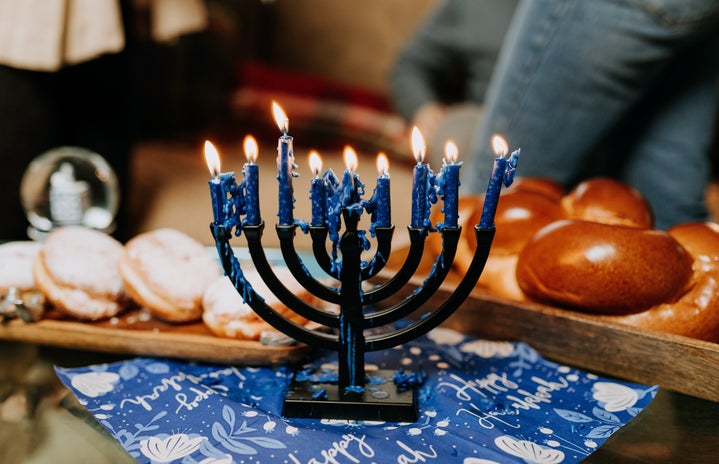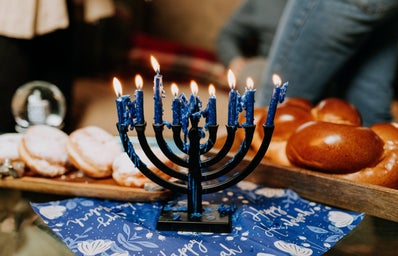In a few days, Jewish people all over the world will begin celebrating Hanukkah, the winter “Festival of Lights.” While many people have adopted “Happy Hanukkah!” into their holiday vocabulary to be inclusive, many aren’t aware of what it really means. Wondering why your Jewish friends will be lighting candles and eating chocolate coins for a whole week? You’re in luck! This article will address the most common questions and misconceptions about the December holiday.
When is Hanukkah 2023?
This year, Hanukkah starts at sundown on Dec. 7 and ends sundown on Dec. 15! In Judaism, days start and end in the evenings, so one day is sundown to sundown. Since Hanukkah is a commemorative eight-day festival, it starts at sunset on the seventh and goes until the sunset eight days later.
What is Hanukkah? How did it start?
Hanukkah is the only holiday with a clear historical account of its origins, and it’s actually one of only two holidays NOT mentioned in the Hebrew bible. During 169 to 166 B.C.E., Syrian Greeks occupied the ancient land of Israel, attempting to control and convert the Jewish population who resided there. Their leader defiled the temple in Jerusalem and banned the practice of Judaism. A family called the Maccabees, led by a priest named Matthias and his sons, waged a resistance against them.
As the story goes, after emerging victoriously, they entered the temple once again and cleansed and rededicated it. During this process, they wanted to kindle the menorah and found a single jar of oil left undefiled by the Greeks. The oil burned for eight days.
What do you do to celebrate?
The most well-known practice is lighting the candles each night. We have a special nine-branched menorah called a Chanukiah, and every night of Hanukkah we light candles depending on which night it is. The shammash, the ninth “helper candle” (often in the center) is lit every night and used to light the other candles. You light one for each night, so only one on the first night, two on the second, and so on. The Chanukiah is meant to be placed at a window of the home so that the light of its candles can be seen from the outside.
Since Hanukkah is associated with the miracle of the oil, many families also eat different fried foods. These include latkes, the fried potato pancakes of sorts, and sufganiyot, fried jelly donuts. Chocolate coins called gelt are seen around homes at this time of year and used in the children’s game Dreidel. Dreidel involves spinning a top that has a Hebrew letter on each side, each corresponding to a different action the player takes with the pot of chocolate coins in the center of the game. The letters on each side of the dreidel—a nun, gimel, hey, and shin—form an acronym for a Hebrew saying: “Nes gadol haya sham” (a great miracle occurred there). Their actions are as follows:
Nun – Do nothing.
Gimel – Take everything in the pot.
Hey/Chai – Take half of the pot.
Shin – Add a piece to the pot.
Isn’t it just a Jewish version of Christmas?
While Hanukkah has been heavily commercialized recently in America, this couldn’t be farther from the truth! Religiously, Hanukkah is a minor holiday, with the Jewish New Year and Day of Atonement in early fall claiming the role of most significant. In the twentieth century, many Jewish communities began to highlight the holiday more, seeing it as a time of pride and joy in Jewish identity in the face of rising discrimination.
That sentiment remains true today. As tensions rise and Jewish populations around the world watch rates of anti-semitism rise, gathering together in joy is so important. In modern times, Hanukkah has come to be a symbol of cultural pride filled with giving and celebration.
As we approach the diverse array of holidays occurring in December, I implore you to take a closer look into each culture’s individual customs. Don’t just wish someone a “happy holiday” without understanding why it’s significant. Learn just one new fact about their celebration and listen to them if they want to share what it means for them personally — don’t let them go unheard. Your Jewish friends will appreciate it.




